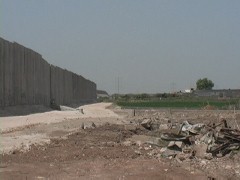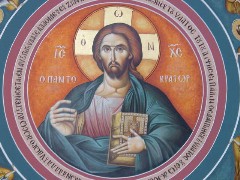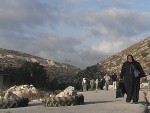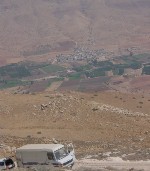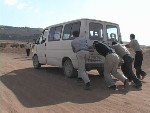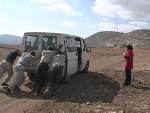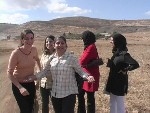|
3:00 AM, Rooster (3 sec.) 3:00 AM, Dogs (5 sec.) 4:45 AM, Muslim prayer (40 sec.) 6:00 AM, Church bells (40 sec.) 7:30 AM, National Anthem (40 sec.) |
|
Monday, 9/1/03: We came back yesterday from vacation in Finland and spent the night in our room at Star Mountain. After sleeping in, we spent the day catching up on the unbelievable pile of email which had accumulated during our absence, including many responses to our most recent update. In the evening we met up in Ramallah for drinks with some Palestinian friends from Birzeit University. One of them suggested we go to a place calling itself "Lebanese Restaurant." We sat in the section set up traditionally with cushions on the floor and low tables. It was fun to be able to read the menus in Arabic - our summer classes showing their benefit. When the waiter eventually came to get our order, the conversation went something like this:
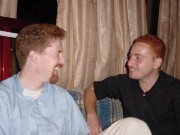 |
"What would you like?"
"The hot chocolate looks good." "Oh, sorry, we're out of that." "OK, then I'd like the cappuccino." "Um, we don't have that either." "Can I get the fruit shake?" "I'm sorry, we don't have any fruit right now." "What do you have?" "Hold on, let me check." |
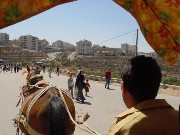 Tuesday,
9/2/03: We packed up our things at Star Mountain, said our farewells,
and started a long journey to Jerusalem. For the first time we availed
ourselves of the horse carriages at Surda. Since the roadblocks returned
last month (so much for the loudly proclaimed opening in July), the roadside
fruit vendors have, too, along with the horse and donkey carriages.
Usually we walk the distance but with all our bags we decided to splurge
the one shekel and ride. After many taxi rides and checkpoints, we arrived
in Jerusalem at the Latin Patriarchate. Fr. Aktham has been in Jerusalem
today, and is headed back to Zababdeh this afternoon, so we're bumming
a ride with him, since he will get through checkpoints in his Israeli-plated
car much faster than we would in a Palestinian taxi. Before leaving
we ran a few errands around town, and then tucked ourselves in Fr.
Aktham's backseat, behind him and Sister Isabel and next to a big box of
equipment for the school. It was a smooth (and cozy) ride. At Hamra checkpoint,
the soldier asked for Fr. Aktham's passport. After looking at his
Jordanian passport, he asked for his ID. "You want my Jordanian ID?" "Yes."
"I don't even have to show this in Jordan! Why isn't a passport enough?
I have the visa right there!" After seeing the Jordanian ID, the soldier
waved us through. Soon we arrived in Zababdeh and were happy to be
back home.
Tuesday,
9/2/03: We packed up our things at Star Mountain, said our farewells,
and started a long journey to Jerusalem. For the first time we availed
ourselves of the horse carriages at Surda. Since the roadblocks returned
last month (so much for the loudly proclaimed opening in July), the roadside
fruit vendors have, too, along with the horse and donkey carriages.
Usually we walk the distance but with all our bags we decided to splurge
the one shekel and ride. After many taxi rides and checkpoints, we arrived
in Jerusalem at the Latin Patriarchate. Fr. Aktham has been in Jerusalem
today, and is headed back to Zababdeh this afternoon, so we're bumming
a ride with him, since he will get through checkpoints in his Israeli-plated
car much faster than we would in a Palestinian taxi. Before leaving
we ran a few errands around town, and then tucked ourselves in Fr.
Aktham's backseat, behind him and Sister Isabel and next to a big box of
equipment for the school. It was a smooth (and cozy) ride. At Hamra checkpoint,
the soldier asked for Fr. Aktham's passport. After looking at his
Jordanian passport, he asked for his ID. "You want my Jordanian ID?" "Yes."
"I don't even have to show this in Jordan! Why isn't a passport enough?
I have the visa right there!" After seeing the Jordanian ID, the soldier
waved us through. Soon we arrived in Zababdeh and were happy to be
back home. 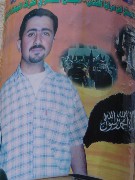 Wednesday,
9/3/03: This morning, Elizabeth went to the school to tie up some loose
ends and to greet everyone. It was very nice to see all the teachers and
students - we'll sure miss them when we leave. School has been in
session for a week now, and most of that time the Jenin kids have not been
able to come. We hope this school year will be smoother for them, but this
is not a very promising start. Then Elizabeth spent much of the day
cleaning the apartment, which seems to have accumulated a year's worth
of dust in our absence. Marthame went to Tubas to do some research
for our film. We are trying to choose people we have come to know
who, collectively, represent Christians in the northern West Bank.
We were looking for someone from Tubas, and it looks like we have found
her - a college student who studies in Nablus. Also today we learned
that a wanted AAUJ student was killed. He was the young man we wrote
a story about a while back - it looks
like he didn't turn himself in after all. The story circulating is
that he was killed at a checkpoint - stories conflict as to whether he
was carrying a weapon or not. But now his poster is all over town.
Wednesday,
9/3/03: This morning, Elizabeth went to the school to tie up some loose
ends and to greet everyone. It was very nice to see all the teachers and
students - we'll sure miss them when we leave. School has been in
session for a week now, and most of that time the Jenin kids have not been
able to come. We hope this school year will be smoother for them, but this
is not a very promising start. Then Elizabeth spent much of the day
cleaning the apartment, which seems to have accumulated a year's worth
of dust in our absence. Marthame went to Tubas to do some research
for our film. We are trying to choose people we have come to know
who, collectively, represent Christians in the northern West Bank.
We were looking for someone from Tubas, and it looks like we have found
her - a college student who studies in Nablus. Also today we learned
that a wanted AAUJ student was killed. He was the young man we wrote
a story about a while back - it looks
like he didn't turn himself in after all. The story circulating is
that he was killed at a checkpoint - stories conflict as to whether he
was carrying a weapon or not. But now his poster is all over town.Thursday, 9/4/03: Marthame went off to Jalame this morning to do research for our film. One of the most important issues these days (perhaps the issue) is the Wall. It has affected both Muslim and Christian Palestinians adversely,
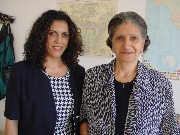 and
we are anxious to include this in the film. Fr. Firas and Marthame
went there and visited with some folks for a few hours before heading back
to Zababdeh. This morning Elizabeth went to the school again for
a couple meetings.
and
we are anxious to include this in the film. Fr. Firas and Marthame
went there and visited with some folks for a few hours before heading back
to Zababdeh. This morning Elizabeth went to the school again for
a couple meetings. 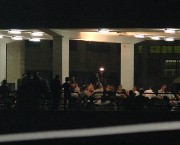 As
they finished she got word that our friends from Nablus, who are to stay
with us tonight, had arrived. Often we enjoy the immense hospitality
of Palestinian people (including these friendly folks), so it is nice to
offer it to them. Our friends were delivered to the Latin School,
so when Elizabeth finished her meetings, she and they went back to the
apartment to get settled. Then our friends then went out to do some
visits while Elizabeth whipped up some cauliflower, eggplant, and chicken
maqlube
for lunch, along with cucumber-tomato-onion salad and fresh yoghurt. (Palestinians
have delicious food, and they know it. Hence Elizabeth felt a shiver
of intimidation to prepare their food for them, especially when they are
as good cooks as these two guests are. Luckily, they are as gracious
as they are hospitable, so if they felt lunch wasn't up to snuff, we wouldn't
have known.) The road from Nablus took them a bit more than two bumpy,
dusty hours, so after lunch they were more than ready for a rest and a
shower. They are in town to attend a wedding tonight; one of Zababdeh's
sons who lives in the States is getting married to a young woman from Nablus.
We did not go to the wedding, but the music was so loud at the nearby school
playground (where most wedding parties are held) that the party practically
came to us (audio - 8 sec.).
As
they finished she got word that our friends from Nablus, who are to stay
with us tonight, had arrived. Often we enjoy the immense hospitality
of Palestinian people (including these friendly folks), so it is nice to
offer it to them. Our friends were delivered to the Latin School,
so when Elizabeth finished her meetings, she and they went back to the
apartment to get settled. Then our friends then went out to do some
visits while Elizabeth whipped up some cauliflower, eggplant, and chicken
maqlube
for lunch, along with cucumber-tomato-onion salad and fresh yoghurt. (Palestinians
have delicious food, and they know it. Hence Elizabeth felt a shiver
of intimidation to prepare their food for them, especially when they are
as good cooks as these two guests are. Luckily, they are as gracious
as they are hospitable, so if they felt lunch wasn't up to snuff, we wouldn't
have known.) The road from Nablus took them a bit more than two bumpy,
dusty hours, so after lunch they were more than ready for a rest and a
shower. They are in town to attend a wedding tonight; one of Zababdeh's
sons who lives in the States is getting married to a young woman from Nablus.
We did not go to the wedding, but the music was so loud at the nearby school
playground (where most wedding parties are held) that the party practically
came to us (audio - 8 sec.). Friday, 9/5/03: The weather has turned; this morning the sky was full of clouds and the air seemed to carry a hint of mist. We're all ready for a break in the heat. Our guests had a small breakfast of tea, bread and za'atar (thyme and sesame spice mix) - anything heavier might add to car sickness on the long bumpy ride to Nablus. With our best wishes for safe travel, they caught a taxi south. Soon Fr. Aktham called with a proposal for Marthame. A new French teacher is arriving today, so Marthame and Deacon Imad went to pick her up from Ben Gurion airport. Getting there was not a problem - we were stopped at many checkpoints, and Deacon Imad's passport was always scrutinized much more than Marthame's - par for the Arab course. The same was true once we
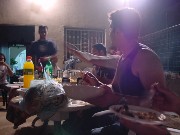 reached
the airport. A quick glance at the American passport was followed
by a careful scrubbing of the Jordanian one - despite the clergy collar.
Veronique arrived, and we began the trip back. We breezed through
all of the checkpoints until we reached Hamra. "No way. You
are foreigners." "But we came from here a few hours ago." "We
weren't here. You can't enter." "But we live there. We've
been living there for three years. My wife is there!" "Hold
on. I'll talk to the Captain." An hour later, "Nope.
Sorry." Finally, after two and a half hours of the most surreal experience,
we were allowed to pass. This event will no doubt end up in a story
we write, because there's far more than can be summarized here - a soldier
who learned English from watching Monty Python; joking with one of the
soldiers about his girlfriend; being scolded and threatened by another
for talking to Palestinians who passed through the checkpoint; watching
the sun go down and wishing each other "Shabbat Shalom"; two kind soldiers,
two that cannot be described kindly. Surreal. In the evening,
after some time to clean up and rest, we joined Fr. Aktham, Deacon Imad,
and Veronique at a family's home for a farewell party. Their son will go
to France in a few days, and so we joined the flock of young men to eat
drink and wish him well.
reached
the airport. A quick glance at the American passport was followed
by a careful scrubbing of the Jordanian one - despite the clergy collar.
Veronique arrived, and we began the trip back. We breezed through
all of the checkpoints until we reached Hamra. "No way. You
are foreigners." "But we came from here a few hours ago." "We
weren't here. You can't enter." "But we live there. We've
been living there for three years. My wife is there!" "Hold
on. I'll talk to the Captain." An hour later, "Nope.
Sorry." Finally, after two and a half hours of the most surreal experience,
we were allowed to pass. This event will no doubt end up in a story
we write, because there's far more than can be summarized here - a soldier
who learned English from watching Monty Python; joking with one of the
soldiers about his girlfriend; being scolded and threatened by another
for talking to Palestinians who passed through the checkpoint; watching
the sun go down and wishing each other "Shabbat Shalom"; two kind soldiers,
two that cannot be described kindly. Surreal. In the evening,
after some time to clean up and rest, we joined Fr. Aktham, Deacon Imad,
and Veronique at a family's home for a farewell party. Their son will go
to France in a few days, and so we joined the flock of young men to eat
drink and wish him well. 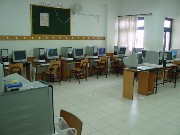
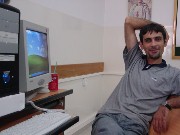 Saturday,
9/6/03: At school today, Marthame took pictures of the new computer
lab, a great new
Saturday,
9/6/03: At school today, Marthame took pictures of the new computer
lab, a great new 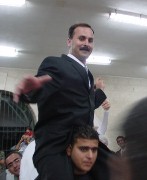
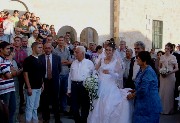 resource
for the school. We're all pleased by it, but none so much as the
computer teacher, who looks these days like the cat that ate the canary.
A number of donors contributed to its construction, and all of them will
want to see pictures of how it looks. This evening was the wedding
of the school's vice principal, a well-loved and respected man.
The service was beautiful and the party was huge, of course with music,
dancing, and traditional mansaf (rice and meat with yoghurt sauce)
for everyone. Several students from the school organized a grand
entrance for the bride and groom as they came to the party, with chanting
and singing and big fire torches (the party was outside). It was a joyful
event. We returned home to the news of the assassination attempt on Hamas
spiritual leader Sheikh Yassin and the resignation of Prime Minister Mahmoud
Abbas. Dark days loom ahead.
resource
for the school. We're all pleased by it, but none so much as the
computer teacher, who looks these days like the cat that ate the canary.
A number of donors contributed to its construction, and all of them will
want to see pictures of how it looks. This evening was the wedding
of the school's vice principal, a well-loved and respected man.
The service was beautiful and the party was huge, of course with music,
dancing, and traditional mansaf (rice and meat with yoghurt sauce)
for everyone. Several students from the school organized a grand
entrance for the bride and groom as they came to the party, with chanting
and singing and big fire torches (the party was outside). It was a joyful
event. We returned home to the news of the assassination attempt on Hamas
spiritual leader Sheikh Yassin and the resignation of Prime Minister Mahmoud
Abbas. Dark days loom ahead. Sunday, 9/7/03: This morning we shared in worship with the Orthodox church, after which Marthame went with Fr. Thomas to visit one of Zababdeh's native sons who lives in Milwaukee. As with most days, we spent most of the rest of our time working on our film and our upcoming itineration. There was another wedding tonight, and again, we could hear the party music as we worked away into the wee hours.
Monday, 9/8/03: Elizabeth took a break from her work today to visit a neighbor, a pediatrician from Zababdeh who recently moved back home from Germany. We had a nice time chatting and drinking tea until someone brought their feverish baby in, and she had to get to work. She made a disturbing comment about her years in Germany: "I was astonished by how much anti-Jewish hatred I found in Germany - and among the younger generation too. Other Palestinians I knew there were also surprised that we found more of this prejudice in Germany than in Palestine. I think people thought they were 'safe' sharing their views with us because they assumed Palestinians would agree with them." In her case, at least, they were wrong.
Wednesday, 9/10/03: As part of our work on our film, we made a trip to Jalame, a border town at the northern tip of the West Bank. One of the teachers at the Arab American University, who is from a village near Jalame, went with us. When we first arrived in this land back in August 2000, there was a commonly-used road running from Jenin, alongside Jalame, across the Green Line, up toward Afula and Nazareth. We recall our first time on the road, as we took a shared taxi from Jenin to Nazareth (costing a few shekels and taking about half an hour), and we were astonished that the multitude of shops and markets along the road all had signs in Hebrew and Arabic. Someone explained to us that these businesses rely on Israelis who come into the West Bank to buy produce and other things for less money than they cost in Israel. Similar border markets flourished all along the Green Line. No longer, of course, is that journey possible, and no longer are those border shops in business. Or even standing. Where all those shops used to be is now razed ground. We walked along a side road coming out of Jalame, where some shopkeepers have tried to re-start their businesses, relying on local clientele to buy their tomatoes, cucumbers, and plastic kitchenware. However, recently many of these shops, too, have been demolished or given demolition orders. One man said shared his conversation with the officer who delivered a demolition order yesterday:
| "What are you going to demolish? I only have this tarp and crates of
vegetables!"
"You must leave this area for security reasons." "What can I do now? This is my only work!" "Go to Jordan." "If you take my business away here at least give me permission to work in Israel and I can support my family." "Go to Jordan." |
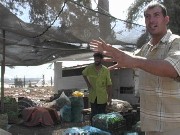 |
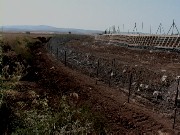 away
at the
away
at the 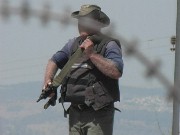 border.
A West Bank Palestinian man looking for work to support his family is exactly
who Jordan does not
border.
A West Bank Palestinian man looking for work to support his family is exactly
who Jordan does not 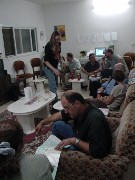 want
to allow in. As we turned away, a truck pulled up next to us. The
driver, seeing our camera, wanted to tell his story too. "I had a
shop along the main road, and every year I paid Israeli taxes on it. And
then two years ago it was demolished with the rest of them. I had
to start over from zero, so I moved my wares into Jalame. Now they
want to destroy this place, too." We left with our friend and headed
toward the border to take a look at The Wall (a.k.a. separation wall, apartheid
wall, security fence), which is growing daily here. The foundations are
laid, the barbed wire in place, the security roads in use; the buffer
zone and six meter cement wall are in progress - all located on uncompensated
Palestinian land inside the Green Line. After filming for a
while, we attracted the attention of Wall Security, who eventually started
to yell at us. While they couldn't exactly get past the barrier to
come after us, they did have big guns, so we decided it was time to leave.
We will need to come back another day with our subject, a Christian man
in Jalame who has lost land to the wall. In the meantime, we're sweaty
and dusty and need to get ready for a party. We've invited the foreign
teachers from the University over for a get-together. There are seven new
ones this fall, and we haven't had the chance to get to know them.
So the coals need to be lit, the chicken marinated, and the lentil soup
started. Soon enough the food and the place was ready and our guests arrived
and a good time was had by all.
want
to allow in. As we turned away, a truck pulled up next to us. The
driver, seeing our camera, wanted to tell his story too. "I had a
shop along the main road, and every year I paid Israeli taxes on it. And
then two years ago it was demolished with the rest of them. I had
to start over from zero, so I moved my wares into Jalame. Now they
want to destroy this place, too." We left with our friend and headed
toward the border to take a look at The Wall (a.k.a. separation wall, apartheid
wall, security fence), which is growing daily here. The foundations are
laid, the barbed wire in place, the security roads in use; the buffer
zone and six meter cement wall are in progress - all located on uncompensated
Palestinian land inside the Green Line. After filming for a
while, we attracted the attention of Wall Security, who eventually started
to yell at us. While they couldn't exactly get past the barrier to
come after us, they did have big guns, so we decided it was time to leave.
We will need to come back another day with our subject, a Christian man
in Jalame who has lost land to the wall. In the meantime, we're sweaty
and dusty and need to get ready for a party. We've invited the foreign
teachers from the University over for a get-together. There are seven new
ones this fall, and we haven't had the chance to get to know them.
So the coals need to be lit, the chicken marinated, and the lentil soup
started. Soon enough the food and the place was ready and our guests arrived
and a good time was had by all. Thursday, 9/11/03: This morning we headed out early with the camera and extra water, hoping we would make it to Qalqilia, a town on the northwestern edge of the Green Line. Our taxi driver from Zababdeh was prepared to take us as far as Tulkarem, a little over an hour's round-about ride. On the way we heard on the radio that five students from the Arab American University of Jenin had been arrested overnight and that Qalqilia was under curfew. Knowing
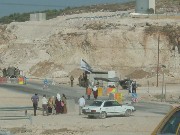 that
on-the-ground conditions can change by the moment, and that news isn't
always accurate, we decided to keep going, and hope that we could get into
Qalqilia. Located in a fertile area with abundant aquifer water,
Qalqilia was a major agricultural center for the West Bank. Since
the completion of The Wall, however, the city has been cut off from about
half of its lands and most of its wells. The Wall here has made such
deep incursions into the West Bank, reaching into the illegal settlements
dotting the countryside in this area, that Qalqilia is entirely surrounded
by this six meter high barrier complete with watchtowers, barbed-wire-marked
buffer areas, and military roads. It is a very distressing sight to see,
especially imagining this huge barrier slicing through the heart of Palestine;
plans show The Wall chopping the West
Bank up into four cantons and other small islands (some call them ghettos)
like Jericho which will be all alone, with its own wall around it.
We came to get footage of this wall, and also to visit the Qalqilia Zoo.
We're trying to lure a filmmaking friend here to make a documentary on
the zoo, and the town which has become like a zoo itself; so we want
to take some footage there too. At Tulkarem, our Zababdeh driver
dropped us off after finding another driving willing to go to the checkpoint
near Qalqilia; after walking across the settler road along with other travelers,
we got a car on the other side and waited along time. Apparently news of
curfew has stopped a lot of people from traveling to Qalqilia today.
that
on-the-ground conditions can change by the moment, and that news isn't
always accurate, we decided to keep going, and hope that we could get into
Qalqilia. Located in a fertile area with abundant aquifer water,
Qalqilia was a major agricultural center for the West Bank. Since
the completion of The Wall, however, the city has been cut off from about
half of its lands and most of its wells. The Wall here has made such
deep incursions into the West Bank, reaching into the illegal settlements
dotting the countryside in this area, that Qalqilia is entirely surrounded
by this six meter high barrier complete with watchtowers, barbed-wire-marked
buffer areas, and military roads. It is a very distressing sight to see,
especially imagining this huge barrier slicing through the heart of Palestine;
plans show The Wall chopping the West
Bank up into four cantons and other small islands (some call them ghettos)
like Jericho which will be all alone, with its own wall around it.
We came to get footage of this wall, and also to visit the Qalqilia Zoo.
We're trying to lure a filmmaking friend here to make a documentary on
the zoo, and the town which has become like a zoo itself; so we want
to take some footage there too. At Tulkarem, our Zababdeh driver
dropped us off after finding another driving willing to go to the checkpoint
near Qalqilia; after walking across the settler road along with other travelers,
we got a car on the other side and waited along time. Apparently news of
curfew has stopped a lot of people from traveling to Qalqilia today. 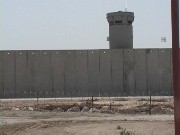 Then
we finally left, went to another roadblock, walked a bit to catch another
taxi to the one entrance to Qalqilia. One by one people approached the
soldiers to get permission to enter. When it was our turn, the soldier
said, "Why do you want to go to Qalqilia?" We said we wanted to meet with
the mayor (true) about children's development projects (not true, but the
advice given us by a journalist). "Are you with an NGO?" "We work with
the church." "So you are not with a humanitarian organization." "The
church isn't humanitarian?" "I mean you aren't with one of the official
groups we accept." "Like who?" "The UN, the Red Cross..." " The Red Cross
is a Christian organization. So is the church." " I know I know, but I
have orders. Let me see what we can do." He left to check on permission
for us to get through. "There's a bench over there in the shade,
if you'd like to sit." "Thanks." After a long wait, he came back,
"Sorry, they say you can't pass." "That's silly! We have an appointment
with the mayor soon!" "I'm sorry,
Then
we finally left, went to another roadblock, walked a bit to catch another
taxi to the one entrance to Qalqilia. One by one people approached the
soldiers to get permission to enter. When it was our turn, the soldier
said, "Why do you want to go to Qalqilia?" We said we wanted to meet with
the mayor (true) about children's development projects (not true, but the
advice given us by a journalist). "Are you with an NGO?" "We work with
the church." "So you are not with a humanitarian organization." "The
church isn't humanitarian?" "I mean you aren't with one of the official
groups we accept." "Like who?" "The UN, the Red Cross..." " The Red Cross
is a Christian organization. So is the church." " I know I know, but I
have orders. Let me see what we can do." He left to check on permission
for us to get through. "There's a bench over there in the shade,
if you'd like to sit." "Thanks." After a long wait, he came back,
"Sorry, they say you can't pass." "That's silly! We have an appointment
with the mayor soon!" "I'm sorry, 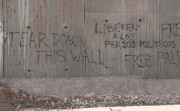 Qalqilia
has stricter rules than anywhere now. But if you are going to see
the mayor, call him. We have very good relations with him. If he calls
the District Coordinating Office, they should give you permission to pass."
"Thanks, we'll do that," We set to work on a flurry of phone calls
followed by a long spell of waiting. Periodically the soldier would
come check up on us. "So where are you from?" "Chicago. Have you been there?"
"No, I haven't traveled much. When I finish my military service I want
to travel. First I'll have to work to save up enough money. But the economy
is so bad now, I'm not sure if I'll be able to." "Where do you want
to go?" "I don't know. Maybe Australia or New Zealand - someplace
really far away from this mess. I'm so tired of it." "Yeah, I bet
it's pretty tough. Lots of soldiers need counseling after their service."
"Yeah, and a lot of them go traveling afterwards to places where drugs
are cheap and just lose it." He then saw a truck pull up and went
to talk to the driver. When he returned he said, "You know, relations here
are not as bad as everyone thinks. We have really good relations with the
people here. That guy's daughter is getting married next week. He
comes through every day. We're like friends." Clearly a lot of Palestinians
can see the young man and not just the soldier uniform; the question we
wanted to ask was if the young man could see what his soldier uniform,
and weapons, and machinery were doing to these people. Eventually,
permission was granted for us to enter, so we said good-bye and headed
on. A taxi took us to the municipality, where we had a very nice
meeting with the mayor, who discussed the desperate situation facing his
town, which in the past three years has lost the vast majority of its economic
sectors. No more border-town business
Qalqilia
has stricter rules than anywhere now. But if you are going to see
the mayor, call him. We have very good relations with him. If he calls
the District Coordinating Office, they should give you permission to pass."
"Thanks, we'll do that," We set to work on a flurry of phone calls
followed by a long spell of waiting. Periodically the soldier would
come check up on us. "So where are you from?" "Chicago. Have you been there?"
"No, I haven't traveled much. When I finish my military service I want
to travel. First I'll have to work to save up enough money. But the economy
is so bad now, I'm not sure if I'll be able to." "Where do you want
to go?" "I don't know. Maybe Australia or New Zealand - someplace
really far away from this mess. I'm so tired of it." "Yeah, I bet
it's pretty tough. Lots of soldiers need counseling after their service."
"Yeah, and a lot of them go traveling afterwards to places where drugs
are cheap and just lose it." He then saw a truck pull up and went
to talk to the driver. When he returned he said, "You know, relations here
are not as bad as everyone thinks. We have really good relations with the
people here. That guy's daughter is getting married next week. He
comes through every day. We're like friends." Clearly a lot of Palestinians
can see the young man and not just the soldier uniform; the question we
wanted to ask was if the young man could see what his soldier uniform,
and weapons, and machinery were doing to these people. Eventually,
permission was granted for us to enter, so we said good-bye and headed
on. A taxi took us to the municipality, where we had a very nice
meeting with the mayor, who discussed the desperate situation facing his
town, which in the past three years has lost the vast majority of its economic
sectors. No more border-town business 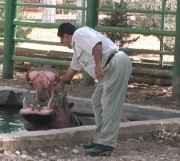 (as
at Jalame, Israelis coming across the border to buy cheaper products);
no more employment in Israel (skilled and unskilled labor was a major source
of work); radically-reduced agricultural potential (cut off from valuable
land and water resources); no more business from surrounding villages and
towns (Qalqilia had been a major business, banking, and medical center
for the area). The irony, he pointed out, was that his town has had very
good relations with Israel - business and professional associations and
joint projects flourished here; many people worked and maintained friendships
on both sides of the border. And somehow it is this town is the one paying
a higher price than the rest of the West Bank. It reminded Marthame
of his visit to the Cherokee lands in northern Georgia. The tribe
that tried hardest to adopt European ways, the Cherokees, were rewarded
with the Trail of Tears. The mayor is afraid that the new situation
facing his residents, without ways to support their families, will drive
them to extremism, which never had a real foothold in Qalqilia. After a
nice interview and coffee, the mayor arranged for a driver to take us to
a few places along the wall to take pictures. Marthame got out of
the truck and filmed until soldiers shouted at us in Hebrew from their
guard towers. The thought that they probably had snipers up there
was sobering. We moved on to the zoo. The head zoo keeper/veterinarian
was very kind to give us an extended tour. The first exhibit was
the box of flares, sound bombs, and used tear gas canisters that have ended
up in the animals' cages since the beginning of this intifada. Then
he walked us around the surprisingly big complex. First up was the
giraffe. Last year, when the army entered Qalqilia one night, they
fired off hundreds and hundreds of rounds to announce their arrival.
When gunfire passed over the giraffe area, the male got stressed out and
began to run around in circles. He eventually ran into the fence and fell
down. If a giraffe stays on the ground for too long, it dies because the
blood pressure necessary to get blood up its long neck will kill it if
(as
at Jalame, Israelis coming across the border to buy cheaper products);
no more employment in Israel (skilled and unskilled labor was a major source
of work); radically-reduced agricultural potential (cut off from valuable
land and water resources); no more business from surrounding villages and
towns (Qalqilia had been a major business, banking, and medical center
for the area). The irony, he pointed out, was that his town has had very
good relations with Israel - business and professional associations and
joint projects flourished here; many people worked and maintained friendships
on both sides of the border. And somehow it is this town is the one paying
a higher price than the rest of the West Bank. It reminded Marthame
of his visit to the Cherokee lands in northern Georgia. The tribe
that tried hardest to adopt European ways, the Cherokees, were rewarded
with the Trail of Tears. The mayor is afraid that the new situation
facing his residents, without ways to support their families, will drive
them to extremism, which never had a real foothold in Qalqilia. After a
nice interview and coffee, the mayor arranged for a driver to take us to
a few places along the wall to take pictures. Marthame got out of
the truck and filmed until soldiers shouted at us in Hebrew from their
guard towers. The thought that they probably had snipers up there
was sobering. We moved on to the zoo. The head zoo keeper/veterinarian
was very kind to give us an extended tour. The first exhibit was
the box of flares, sound bombs, and used tear gas canisters that have ended
up in the animals' cages since the beginning of this intifada. Then
he walked us around the surprisingly big complex. First up was the
giraffe. Last year, when the army entered Qalqilia one night, they
fired off hundreds and hundreds of rounds to announce their arrival.
When gunfire passed over the giraffe area, the male got stressed out and
began to run around in circles. He eventually ran into the fence and fell
down. If a giraffe stays on the ground for too long, it dies because the
blood pressure necessary to get blood up its long neck will kill it if 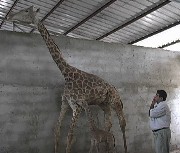 not
fighting gravity. A few days after the male died, the female miscarried
her baby, which had only two more months (of 15) left. "We were all so
sad. We'd been expecting a baby giraffe for more than a year, and now here
it was dead." Our guide is also a taxidermist, and has stuffed the
two, father and unborn baby giraffe, planning to open a museum portion
of the zoo. "If I can't keep animals alive here, at least we can
have the dead ones for people to see." Then we saw the zebra enclosure.
All three zebras died of tear gas. "Over here, what do you see?" "Chickens
and a goose." "Yes. I'm a zoo keeper. This is a zoo. I need zoo animals
- lions, tigers, zebras -. and what do I have? Chickens." The zoo
does still have more than chickens - he proudly showed us monkeys, gazelle,
wolves, bears, a lion, and even gave Ruti the hippo a treat. He has
big dreams to expand, to give the animals more space than their old-timey
cages offer, to acquire animals to replace the recent casualties, and to
open a natural history museum section. But now, when the zoo has only a
small fraction of the business it used to have, these dreams seem impossible.
People from all over the West Bank and even from Israel used to visit the
zoo. In fact many of our students in Zababdeh talk about visits they made
to the zoo (not within the last three years, of course). Now, almost no
one comes. No one can get here. After our very nice but heartbreaking tour,
we retraced our steps, checkpoint to checkpoint, back to Tulkarem, where
our Zababdeh driver met up with us as we hungrily downed delicious grilled
kabob sandwiches and orange soda. The trip back was fortunately uneventful,
and we got home ready to shower and rest. That evening we watched CNN's
coverage of 9/11 memorials. That horrible event seems so long ago
yet so oddly recent. The world has changed so much since that fateful
day....
not
fighting gravity. A few days after the male died, the female miscarried
her baby, which had only two more months (of 15) left. "We were all so
sad. We'd been expecting a baby giraffe for more than a year, and now here
it was dead." Our guide is also a taxidermist, and has stuffed the
two, father and unborn baby giraffe, planning to open a museum portion
of the zoo. "If I can't keep animals alive here, at least we can
have the dead ones for people to see." Then we saw the zebra enclosure.
All three zebras died of tear gas. "Over here, what do you see?" "Chickens
and a goose." "Yes. I'm a zoo keeper. This is a zoo. I need zoo animals
- lions, tigers, zebras -. and what do I have? Chickens." The zoo
does still have more than chickens - he proudly showed us monkeys, gazelle,
wolves, bears, a lion, and even gave Ruti the hippo a treat. He has
big dreams to expand, to give the animals more space than their old-timey
cages offer, to acquire animals to replace the recent casualties, and to
open a natural history museum section. But now, when the zoo has only a
small fraction of the business it used to have, these dreams seem impossible.
People from all over the West Bank and even from Israel used to visit the
zoo. In fact many of our students in Zababdeh talk about visits they made
to the zoo (not within the last three years, of course). Now, almost no
one comes. No one can get here. After our very nice but heartbreaking tour,
we retraced our steps, checkpoint to checkpoint, back to Tulkarem, where
our Zababdeh driver met up with us as we hungrily downed delicious grilled
kabob sandwiches and orange soda. The trip back was fortunately uneventful,
and we got home ready to shower and rest. That evening we watched CNN's
coverage of 9/11 memorials. That horrible event seems so long ago
yet so oddly recent. The world has changed so much since that fateful
day....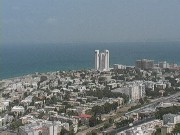 Friday,
9/12/03: Another day, another trip. Today we dragged ourselves
out of bed and got ready to go to Haifa. We need to get some footage for
our film - one of our subjects who now lives in Zababdeh grew up in Haifa,
and fled her home in 1948. We'd hoped she could get permission to
come with us, but was refused. So she connected us with some of her
extended family in Haifa who agreed to meet us and show us around. We bummed
a ride with University folk headed to relax at the Sea of Galilee.
They dropped us off in Afula, where we found the shared taxis headed to
Haifa. Being Friday, it took a long time to fill up, but eventually we
were on our way. We met up with our subject's cousin and family,
who were kind enough to drive us all over the place to get the footage
we needed: a visit to the old family home, where we walked around, looking
at the old well site, how its new residents have expanded and built on
the old foundations, up Mount Carmel where we could get a nice overview
shot of the sea and the city, and then down to the beach, where Elizabeth
and our hostess waded a bit and we got some shots of the water lapping
and the rocks, the sound of which our subject fondly remembers to this
day. We managed to get everything we needed and get back to meet our University
friends to bum a ride back to Zababdeh. Time again to shower and rest.
Friday,
9/12/03: Another day, another trip. Today we dragged ourselves
out of bed and got ready to go to Haifa. We need to get some footage for
our film - one of our subjects who now lives in Zababdeh grew up in Haifa,
and fled her home in 1948. We'd hoped she could get permission to
come with us, but was refused. So she connected us with some of her
extended family in Haifa who agreed to meet us and show us around. We bummed
a ride with University folk headed to relax at the Sea of Galilee.
They dropped us off in Afula, where we found the shared taxis headed to
Haifa. Being Friday, it took a long time to fill up, but eventually we
were on our way. We met up with our subject's cousin and family,
who were kind enough to drive us all over the place to get the footage
we needed: a visit to the old family home, where we walked around, looking
at the old well site, how its new residents have expanded and built on
the old foundations, up Mount Carmel where we could get a nice overview
shot of the sea and the city, and then down to the beach, where Elizabeth
and our hostess waded a bit and we got some shots of the water lapping
and the rocks, the sound of which our subject fondly remembers to this
day. We managed to get everything we needed and get back to meet our University
friends to bum a ride back to Zababdeh. Time again to shower and rest. Saturday, 9/13/03:
|
Jane lives with her family in Tubas and is in her second year of college, studying pharmacology at an-Najah University in Nablus. Before the closures of the current Intifada, the trip to school took fifteen minutes. Now, on a good day, it takes two hours. 5:15 a.m. Marthame and Elizabeth leave Zababdeh in a taxi going to Tubas.
|
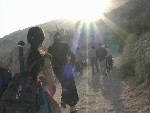
|
Later, we met up with "Jane" after her organic chemistry class and took a look at an-Najah University, whose campus is just buzzing with student life in ways we haven't seen at Birzeit or the Arab American University. In the afternoon, Fr. Hossam Naoum, the Anglican priest for Nablus, in whose compound we are staying, took to look at the new church they are building in Rafidia. He is a busy priest, overseeing the construction of the church, St. Luke's Hospital, the Anglican kindergarten (what cute kids!), and the Anglican congregation in Nablus/Rafidia. As we left the construction site he took us by the site of a recently demolished apartment building. "The owner spent his life savings on that building. A militant was found hiding in it. He didn't live there, he was just hiding in the stairwell, so they blew it up. All those families lost their homes and their belongings and he lost his life's savings. Just like that. It's a crime."
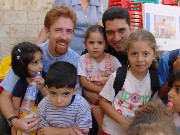
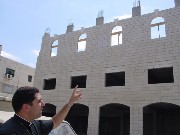
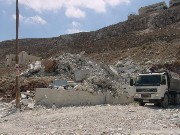
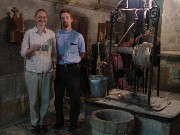
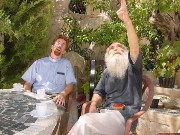 Sunday,
9/14/03: This morning we joined Fr. Hossam in worship at the Anglican
church in Rafidia (Nablus and Rafidia are twin towns, like Ramallah and
al-Bireh, Minneapolis and St. Paul). After church we and our friend who
is a volunteer nurse at the Anglican hospital went to see the Orthodox
Monastery at Jacob's Well, the holy site on the plot Jacob purchased (Genesis
33:18-19) and where Jesus spoke to the Samaritan woman (John 4). Every
other time we'd been here, the interior (where the actual well is) has
been closed due to the construction above it. But this time they've
finished enough work that we were able to descend into the crypt-like interior,
where we lowered a bucket way way down, and cranked it back up so we could
have a drink from the water. Fr. Justinus, the Greek priest in charge
of the reconstruction has been there for twenty-odd years, and only after
Oslo has he been allowed to work on the exterior of the building.
A remarkably talented man, he directs (and often does) the stone-cutting
for the edifice as well as doing the site's stained glass, mosaics, icons,
and frescos. The next time we come, we hope to buy one of the icons
he painted (a few of which are for sale down at the well, along with ten-year-old
postcards and beeswax candles). Today he came down from
Sunday,
9/14/03: This morning we joined Fr. Hossam in worship at the Anglican
church in Rafidia (Nablus and Rafidia are twin towns, like Ramallah and
al-Bireh, Minneapolis and St. Paul). After church we and our friend who
is a volunteer nurse at the Anglican hospital went to see the Orthodox
Monastery at Jacob's Well, the holy site on the plot Jacob purchased (Genesis
33:18-19) and where Jesus spoke to the Samaritan woman (John 4). Every
other time we'd been here, the interior (where the actual well is) has
been closed due to the construction above it. But this time they've
finished enough work that we were able to descend into the crypt-like interior,
where we lowered a bucket way way down, and cranked it back up so we could
have a drink from the water. Fr. Justinus, the Greek priest in charge
of the reconstruction has been there for twenty-odd years, and only after
Oslo has he been allowed to work on the exterior of the building.
A remarkably talented man, he directs (and often does) the stone-cutting
for the edifice as well as doing the site's stained glass, mosaics, icons,
and frescos. The next time we come, we hope to buy one of the icons
he painted (a few of which are for sale down at the well, along with ten-year-old
postcards and beeswax candles). Today he came down from  the
roof to chat with us and drink some coffee. He is a real local treasure
and we feel privileged to share time with him. Back with our friends near
Nablus's Old City, we chat about the recent news. The army had been
in a few days ago, and during the incursion shot a ninety year-old man
in his sleep. His funeral was yesterday - his martyr poster is up
today, its colors soon to fade into the dull blues of the others which
surround it.
the
roof to chat with us and drink some coffee. He is a real local treasure
and we feel privileged to share time with him. Back with our friends near
Nablus's Old City, we chat about the recent news. The army had been
in a few days ago, and during the incursion shot a ninety year-old man
in his sleep. His funeral was yesterday - his martyr poster is up
today, its colors soon to fade into the dull blues of the others which
surround it. Monday, 9/15/03: We went back to an-Najah university to meet with Jane Doe and see if we could meet with someone from administration to talk about our project, and get permission to film Jane in her classes. When we came to the university gate, there were university security officers there. "Are you a student?" "No, I'm here to see a student." "Do you have permission to enter?" "Do I need it? We were here the other day without any problem." "I'm sorry but if you are not a student you need permission to enter. Please stand over here." "Wow, getting into into an-Najah is harder than entering Qalqilia!" Everyone laughed. "I'm sorry it's just we have to be very careful these days." Eventually Jane showed up and we got a security escort to the Public Relations office, where everyone was very friendly and apologetic about us being stopped at the gate. "We have to be very careful these days, you understand." After a very pleasant visit and plenty of tea, we were given the red carpet to film at the University, as long as we give them a copy when we finish. Easy enough. Then we headed off to the Rosary Sisters' school, where two other of our film subjects study. We arrived just in time to see the principal, whom we haven't seen in over a year, have some cool orange juice, and follow the boys as they headed over to their father's goldsmith shop, where they go every day after school. They sit and chat and sometimes help him until it is time to close. Business is very slow these days - no one has money to buy much jewelry. So most of the father's business is jewelry repair and cleaning work - even that is light at best. Around three we all left and went back to their home for a big delicious lunch of stuffed squash and eggplant. In the evening we called Jane Doe and we met up with her and a couple of her friends, one from Tubas and one from Zababdeh. We all went to a local restaurant for knaffe, a Nablus specialty. Nablus is known for sweets, but knaffe is the ultimate Nablus goodie, sweet cheese and pastry threads or crumbly crust with syrup and pistachio bits. It can be like a meal in itself. We chatted over our steaming plates of knaffe and Marthame even filmed how they make it (making the proprietor excitedly bashful). After filling ourselves with the good stuff, we went back to our home away from home away from home for a good night's sleep.
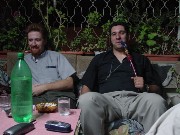
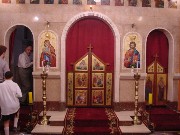 Tuesday,
9/16/03: This morning we had an appointment with another film
subject, an older lady from the Anglican church in Nablus. A retired schoolteacher,
she spoke about her father, who recently passed away at 99 years of age.
"He saw our land under the Ottomans, the British, the Jordanians, the Israelis,
and finally the Palestinian Authority." It is amazing to think of
how many regimes have come and gone here in such quick succession. No wonder
people are yearning for self-rule. We had thought we would leave this afternoon
but decided to stay another day. In the evening we paid a visit to
Fr. Yousef, the Melkite priest in Rafidia. He has recently finished a renovation
of his church and it is lovely. Then we went back to our hosts, for
a calm evening on their balcony, good food and hubbly-bubbly.
Tuesday,
9/16/03: This morning we had an appointment with another film
subject, an older lady from the Anglican church in Nablus. A retired schoolteacher,
she spoke about her father, who recently passed away at 99 years of age.
"He saw our land under the Ottomans, the British, the Jordanians, the Israelis,
and finally the Palestinian Authority." It is amazing to think of
how many regimes have come and gone here in such quick succession. No wonder
people are yearning for self-rule. We had thought we would leave this afternoon
but decided to stay another day. In the evening we paid a visit to
Fr. Yousef, the Melkite priest in Rafidia. He has recently finished a renovation
of his church and it is lovely. Then we went back to our hosts, for
a calm evening on their balcony, good food and hubbly-bubbly. Wednesday, 9/17/03: We left this morning, wondering what kind of trip lay ahead of us to get back to Zababdeh. Although it turned out to be the same steep bumpy dangerous route, to our relief, we were home safe in two (not five or six) hours. We had enough steam left in us to go up to the University where some of the teachers had a get-together involving lots of guitars and beverages. A good (and late) night was had by all.
Friday, 9/19/03: One of the subjects we are filming is Fr. Thomas, the Orthodox priest. His weekends are spent leading services. Today, he prays in Tubas, so Marthame went with him. Tubas is a church with great spirit - though few in numbers, they work hard and have accomplished much. It is always good to share in their fellowship.
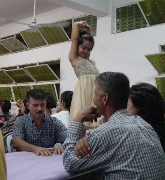
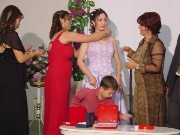 Saturday,
9/20/03: Saturday, Fr. Thomas goes to Burqin. Marthame
joined him in the early morning once again. This historical church
is also a joy to visit, with its ancient Helena-era and pre-Helena-era
sanctuaries. "How fortunate you are, Fr. Thomas told them, "to hear
the steps of Christ passing through your town." This evening, we
were invited to the engagement party of the daughter of dear friends.
We put on our best duds and went to the church hall, which was packed.
Somehow, everything here runs on "Arab time" except parties. Once we came
half an hour after the stated beginning time (what we thought would be
about on time) of a wedding party, and all the food was already served.
So we were not surprised when the fiancé and fiancée arrived
not long after us. Music played as they and their family made a grand
processional entrance, and then there was lots of dancing, some champagne
(which they poured together overflowing some glasses, and then cake for
everyone. And more dancing, and then the presentation of gold to the bride-to-be
by her in-laws. And more dancing.
Saturday,
9/20/03: Saturday, Fr. Thomas goes to Burqin. Marthame
joined him in the early morning once again. This historical church
is also a joy to visit, with its ancient Helena-era and pre-Helena-era
sanctuaries. "How fortunate you are, Fr. Thomas told them, "to hear
the steps of Christ passing through your town." This evening, we
were invited to the engagement party of the daughter of dear friends.
We put on our best duds and went to the church hall, which was packed.
Somehow, everything here runs on "Arab time" except parties. Once we came
half an hour after the stated beginning time (what we thought would be
about on time) of a wedding party, and all the food was already served.
So we were not surprised when the fiancé and fiancée arrived
not long after us. Music played as they and their family made a grand
processional entrance, and then there was lots of dancing, some champagne
(which they poured together overflowing some glasses, and then cake for
everyone. And more dancing, and then the presentation of gold to the bride-to-be
by her in-laws. And more dancing. Sunday, 9/21/03: Today is day three of Fr. Thomas' marathon, now in his hometown of Zababdeh. We went to worship and film once more. Afterwards, we had lunch at his home, a feast of maqlube, one of our favorites. After three days with Fr. Thomas, Marthame is exhausted. How he does it, at age 62, is beyond us.
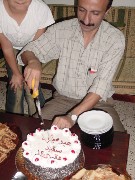 Monday,
9/22/03: After spending the day working at home, Marthame went
out in the evening to meet up with Fr. Thomas. After following him
for three straight days, we realized we need some great Orthodox hymns
in the film. Several members of his church came early to afternoon
prayers to sing Eastern hymns. Haunting and perfect. We also
need to interview Fr. Thomas to get some perspective on all that we've
seen. Again, his tremendous energy and faith show forth in his dedication.
While Marthame was with Fr. Thomas, Elizabeth was out visiting. Good
friends of ours from Jenin are staying with family in Zababdeh these days
because of that city's frequent closures and curfews. Today is his
birthday, and so Elizabeth went to see them, sing Happy Birthday, and eat
cake. After a nice visit, she stopped in with another friend she
hadn't seen in a long time. She works in Jenin, but these days that's
an on-and-off proposition. We caught up with each other over a light
supper of fresh flatbread, cucumbers, yogurt cheese, pickled eggplant,
goat cheese, and tea. Delicious.
Monday,
9/22/03: After spending the day working at home, Marthame went
out in the evening to meet up with Fr. Thomas. After following him
for three straight days, we realized we need some great Orthodox hymns
in the film. Several members of his church came early to afternoon
prayers to sing Eastern hymns. Haunting and perfect. We also
need to interview Fr. Thomas to get some perspective on all that we've
seen. Again, his tremendous energy and faith show forth in his dedication.
While Marthame was with Fr. Thomas, Elizabeth was out visiting. Good
friends of ours from Jenin are staying with family in Zababdeh these days
because of that city's frequent closures and curfews. Today is his
birthday, and so Elizabeth went to see them, sing Happy Birthday, and eat
cake. After a nice visit, she stopped in with another friend she
hadn't seen in a long time. She works in Jenin, but these days that's
an on-and-off proposition. We caught up with each other over a light
supper of fresh flatbread, cucumbers, yogurt cheese, pickled eggplant,
goat cheese, and tea. Delicious. Wednesday, 9/24/03: Another day in front of computer screens, Marthame working on editing and Elizabeth working on our 2004 itinerary. We were very sad when the first email rolled in notifying us that Edward Said died. His death is an enormous loss to the Palestinian community and to the academic world.
Friday, 9/26/03: After a couple days spent in front of computer screens we had serious cabin fever. So we decided to go out for dinner. "Hmm. Shall we go Korean or Ethiopian? Or perhaps the old standby, Thai?" There are times when we really really really miss Chicago. The closest we could get to a night on the town is supper at the University restaurant/coffee shop, where we had grilled kabob and chicken with some of our friends who teach there. Most of them had just come back from Jordan, having had to leave the country and come back to get new tourist visas. For three years the University has been trying to get work visas for its foreign faculty. No dice. So every three months (or less) they have to leave and come back in, hoping to get another three month tourist visa at the border. Once this was standard procedure for many organizations and NGOs. However, now, tourist visas are harder to get if you in any way resemble a peace activist (young, single, carrying a backpack). Again, almost miraculously, all the teachers got back in, although some were given only one month visas. Others were turned away, got new passports at the Amman embassy, and tried the other bridge. We are so very thankful that we have one-year visas through the Latin Patriarchate, so we never had to deal with that run-around.
Sunday, 9/28/03: Today we prayed at the Melkite church, where we haven't been in a long time. After mass, we visited with Fr. Firas and his extended family. We will miss these wonderful people terribly when we leave. This evening Fr. Aktham, Deacon Imad, and the French volunteer Veronique joined us for supper, which was bread and shakshouka (tomato, onion and egg dish) with assorted sides (yogurt cheese, yogurt, za'atar, olive oil, sautéed zucchini). Later the guitar came out and we sang songs over our coffee.
Monday, 9/29/03: Tomorrow we head off so we can fly to Cairo for The Presbyterian Church's Middle East Mission Personnel Retreat in Alexandria. We won't be back until October 8, so today was spent getting as much work on the film and our itinerary done as possible, cleaning the apartment, packing, and tying up loose ends.
Tuesday, 9/30/03: An early morning will have us off, hoping for smooth "sailing" on our path! 937
